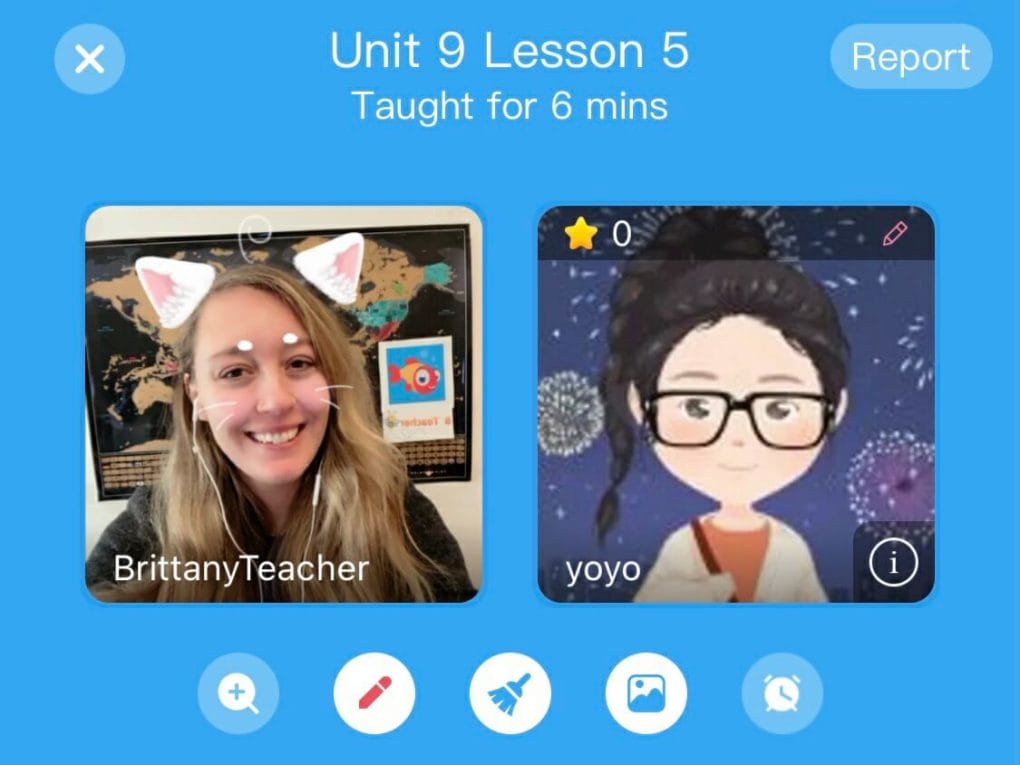If you’re looking to teach English online to Japanese students, this list shares 10 of the best companies.
Working as an online English teacher for Japanese students can be a fun way to learn about Japanese culture, gain professional experience as a teacher, and earn an income online.
Many people have even made teaching English online their full-time job! With the freedom to teach when you want and where you want, there’s no denying that teaching online has opened up the doors to many opportunities.
So whether you’re actually in Japan job hunting or at home trying to find a way to learn more about the culture, here’s where you can apply to teach online to students in Japan.
*This list is meant to be a helpful resource sharing the various online teaching jobs out there. Be sure to do your own due diligence and properly vet each company to ensure it’s a good fit for you.
Read more: Best Companies to Teach English Online
This post may contain affiliate links, meaning at no additional cost to you, if you click my links and make a purchase, I may earn a small commission. Learn more on my disclosure page. Thank you for your support!

Job Requirements for Teaching English Online to Japanese Students
Before you can start teaching English to Japanese students online, you have to make sure you’re eligible! Every company has unique job requirements, but for the most part, this is what you’ll need to get hired:
1. Be a Native English Speaker
No matter the company, online English teachers need to speak English. Some places only hire native speakers from countries like the U.S., U.K, Canada, Ireland, Australia, or New Zealand.
South Africans are also usually eligible for online English teaching jobs; but not always.
If you’re a non-native English speaker but speak English at a native level, you might have to prove your English ability with a degree or TOEFL certificate.
2. Have a TEFL Certificate
The second most important job requirement is having a TEFL certificate, and companies usually want to see a 120-hour TEFL or more. The number of hours may not be significant for some jobs, but 120 is typically the industry baseline.
If you’re currently thinking – What is a TEFL certification?, it’s a qualification aspiring teachers earn after taking a training course online or in-person that can last anywhere between 3-4+ weeks.
Check out some of my recommended providers for the best TEFL certifications online.
3. Have a Bachelor’s Degree (Sometimes)
For many online teaching jobs, companies require teachers to have a degree. It usually doesn’t matter what in, just so long as you graduated college. This is, unfortunately, one of the major cons of teaching English online.
If you’re a licensed teacher, even better! You probably don’t need a TEFL certificate in that case.
For those who didn’t go to college, you still have options for teaching English online without a degree.
4. Have Teaching Experience (Sometimes)
Some platforms will ask teachers to have teaching experience, but it’s not always required. But any teaching experience you do have will obviously make your application more competitive.
Any experience related to working with children is worth sharing when applying.

Peak Hours for Teaching English Online in Japan
Japan’s peak online teaching hours are on weekday mornings and evenings as well as weekend days – essentially when learners are off of work and/or school.
Aspiring teachers who wish to teach Japanese students need to be available during these peak times, which can be difficult depending on your time zone. To give you an idea of the time difference, Tokyo is 8 hours ahead of London, 14 hours ahead of Chicago, and 16 hours ahead of Los Angeles.
That means Japan’s peak teaching hours fall to the early morning hours in the United States (5 am – 8 am) or the mid-afternoon in Europe (about 12 pm – 3 pm).

8 Companies That’ll Hire You to Teach English to Japanese Students Online
1. Engoo English – Teach English to Young Students in Japan
Engoo is an online platform for school-aged students from Japan, Taiwan, and other parts of the world. Lessons are one-on-one and run for 25 minutes, but a student can book up to 3 slots in a row for a single class.
Engoo provides all lesson materials online so that means teachers have less on their plates. But teachers should have a desktop or laptop with a webcam. Teaching experience is not required, but you must be at least 18 years old and have a strong mastery of the English language.
Payment
Engoo pays native-English teachers about $10-$11 per hour, and non-native English speakers receive $4-$5/hour. Teachers must have a Payoneer or PayPal account to receive their monthly payments.
How to Apply
To apply, you’ll need to fill out the online application form that asks for your basic personal information and a document proving your I.D. After you’ve registered, you’ll have to pass a video screening and then complete a training session.
The video screening includes an informative briefing followed by a mock demo lesson supervised by Engoo staff which lasts about an hour. You also have to prove that your internet is at least 1MBPS and then complete a 2-hour training sesh.
If you don’t pass the application process the first time, you can retry in six months.
Apply to Engoo English.

2. S-Lessons – Teach English Online to Young Japanese Students
S-Lessons hires native English speakers to teach English to Japanese children over Skype. There are two different programs; the “Regular Course,” where lesson materials are provided, and “Leave it to Teacher,” where teachers create the materials.
The lessons run for 25-minutes, and teachers are expected to fill out a 3-minute student evaluation after every class.
To be eligible, applicants need at least one full year of previous teaching experience.
Payment
Teachers are free to set their own rates via S-Lesson’s unique point system, where 1 point equals ¥1. Teachers charge anywhere from ¥500 – ¥3,000 per class, depending on qualifications and experience. S-Lessons take a 30% percent cut of teachers’ earnings.
How to Apply to S-Lessons
The application isn’t always open at S-Lessons due to high competition, but be sure to check back occasionally.
Interested applicants need to fill out an application form and send along a resume. Those who pique their interest will proceed with a Skype interview and then a Skype demo lesson with an interviewer pretending to be a student.
Learn more about the S-Lessons application.

3. Cena English – Teach English to Professional Adults
Cena English is an English tutoring platform for professional adults in Japan. Teachers are responsible for preparing lessons, and all classes are taught over Skype. CenaEnglish helps introduce prospective students to teachers via a trial lesson, and from there, the student can book future courses if they feel it’s a good fit.
Teachers need to have a Bachelor’s or Master’s degree, proof of a TEFL certification or teaching license, and an internet speed of at least 1.5 Mbps.
Payment
Cena English pays their teachers one of the best wages at $22 for the standard 50-minute lesson and $11 for the 25-minute trial lessons. Teachers are paid once a month via PayPal.
How to Apply to Cena English
To apply, you’ll need to email the company directly at [email protected]. For exact instruction, peep their website. In summary, you need to send your profile (DOB, place of birth, time zone, address of residence, your education level and qualification, hobbies, etc.) and a nice, clear photo of you.
The website says it doesn’t need to be professional, so feel free to send a photo that showcases your personality.
Check out how to apply to Cena English.

4. CafeTalk – Teach English to Japanese University Students
With CafeTalk, teachers set their rates and design their classes, and lessons aren’t restricted to just English. Topics like art, I.T., and hobbies, for example, are all fair game.
Classes are booked via CafeTalk’s online messaging system and should be held over Skype on a P.C. or tablet. Teachers often communicate with new students before lessons to learn a bit about their goals and share files. Teachers are also expected to type up a report after each class that summarizes the student’s progress and things to improve.
Payment
You’re free to set your own rates, but people often charge ¥500 – ¥2,000 ($5 – $18) per 25-minute lesson. CafeTalk takes a percentage of earnings for their efforts in connecting you with students. CafeTalk’s commission rates are a little complicated but essentially range from 35% – 30% or less, and the percentage taken depends on the level of earnings for any given month.
Teachers are paid on the 15th of each month via PayPal, Payoneer, or a direct bank transfer. Payments are sent once the minimum threshold of ¥3,000 ($27) is reached.
How to Apply to CafeTalk
Applying to CafeTalk is fairly straightforward and entails registering, filling out a profile, and undergoing a video interview. Once you pass the interview, you’re free to start uploading lessons and teaching students.
Teachers who speak Japanese, Chinese or Korean or have experience living in these countries will have a leg up in the application process.
Read more about how to apply to CafeTalk and their pay scale system.

5. Best Teacher – Hires Non-Native Speakers to Teach English Online
Best Teacher hires teachers from all over the world to plan and lead lessons for university-aged Japanese students. All classes take place over Skype, and there’s also a possibility to receive payment for editing and replying to conversations.
Lessons should meet the goals and personal preferences of the students while staying true to BT’s four focuses of writing, speaking, reading, and listening.
To teach with BestTeacher, you don’t need to come from a specific country – you just need to prove your English ability via tests you’ll take in the application. That means people from countries that don’t “officially” speak English can teach with Best Teacher.
Payment
Best Teacher pays online English tutors a pretty abysmal rate of only $5 – $6 per hour, but I wanted to include them as another option because they’re one of the rare companies that hire non-native English teachers. They also have low application requirements and accept a wider range of teachers.
How to Apply to BestTeacher
To apply to BestTeacher, you’ll need to register and sign up online, take and pass the application English grammar test (45 minutes), and then complete a written English test (45 minutes). If you pass both tests, you’ll be invited to have an interview and complete BT training on Skype. Then you’re all set to start teaching!
Best Teacher’s application can be found here.

6. Lyngo – Teach English Without Experience or a TEFL
Lyngo is an online platform that hires teachers without teaching experience, and having a TEFL certificate is not mandatory. Lyngo provides intensive training to all new teachers after passing the interview and provides all of the lesson materials.
Students are typically young learners between the ages of 5-15 years old and are taught one-on-one. Teachers must have a stable internet connection, a webcam and headset with a microphone, and a computer with Skype.
Payment
Teachers are paid between ¥900 to ¥1,500 ($8-$14) per hour, depending on the type of class and incentives. Payment is sent once a month via PayPal.
How to Apply
Lyngo makes applying easy. Simply fill out their form and submit your resume on their page on Indeed. If they like your resume, they’ll contact you for an interview.
Apply to teach with Lyngo!

A screenshot of my online classroom for PalFish
7. Eigox – Teach a Wide Range of Japanese Students
Eigox is an online platform that offers three different methods of teaching/instruction: free talk conversation exchange, textbook-based/formal learning, or less formal material-based lessons. Classes run for about 25 minutes, and teachers are expected to tailor lessons to their student’s goals and learning preferences.
Being a native speaker or having native ability is required. Teachers also must teach on a computer with a headset and need to be available to teach at least 10 hours per week.
Payment
Eigox pays Filipino and non-native tutors a low rate of 160 ($1.50) per 25-minute lesson and native speakers or Japanese bilingual tutors ¥600 (US$5.40). Tutors can receive pay increases based on work performance.
Payments are made once a month via PayPal.
How to Apply
If you wish to teach English with Eigox, you’ll need to fill out their online application form. The second step is recording a video message sharing a bit about yourself. If they like your greeting, they’ll invite you to an interview.
Become an online English tutor with Eigox.

8. E-communication – Teach a Foreign Language to Japanese Business Students
E-communication connects Japanese adults seeking to learn a foreign language with online tutors. The languages taught on E-communication vary from French, German, Russian, Spanish, and many more. Lessons are conducted over Skype and run for 30 minutes up to 1.5 hours. Teachers are responsible for creating their own lesson materials.
To get hired, teachers should have at least two years of ESL experience and be available at least 20 hours a week.
Payment
E-communication is another of the best paying online English teaching jobs in Japan. They pay a standard rate of ¥2,000-¥2,300/hour for those living in Japan, €13-€16 for those in Japan, and $16-$20/hour for Americans.
How to Apply
Applying to teach with E-communication is a bit intensive. Aspiring teachers must pass an initial resume screening, a first and second interview, and two demo lesson presentations. As one of the highest paying online teaching platforms for Japanese students, it makes sense the application process is pretty intense!
If you’re not successful the first time you apply, you’re free to try again in six months after your initial application.
Apply to E-communication here!

Tips For Teaching English Online to Japanese Students
Equipment Needed to Teach English to Japanese Students Online
During the application process and while teaching, there are a few things teachers must have to be successful:
- Fast and reliable internet
- Computer with a webcam
- Headphones with a microphone
- Fun background and teaching props
Things to Know When Applying for English Teaching Jobs Online
Companies sometimes pause accepting applications depending on their current student-to-teacher ratio. But that doesn’t mean they’ll never hire again! If the company of your dreams has closed applications, be sure to check back every couple of months.
It’s not uncommon to have your application rejected the first time. If possible, try to figure out or ask what went wrong, and use that as motivation to try again with a strong application.
The most common rejection reasons tend to be; no degree, no or poor quality TEFL certificate, unprofessional interview or application, or lack of classroom or lesson preparedness.
The best applications are from teachers with a 120+ hour TEFL certificate from a trustworthy company, a Bachelor’s degree, and teaching or experience working with children.
Finding an Affordable TEFL Certificate
Getting TEFL certified can be a daunting task for newbies! At first glance, the courses can seem like a long-term commitment with high price tags, but that’s not the case if you know where to look!
There are a few free TEFL certifications out there, but they usually have unique requirements.
If you only have plans to teach English online, I recommend a cheap online TEFL certificate over something expensive. I recommend companies like iTTT TEFL and PremierTEFL for their affordability and convenient online courses.
If you’re interested in making teaching English a career, I recommend a CELTA, university program, or a more in-depth TEFL from someone like the International TEFL Academy.
I have a 20% discount on iTTT courses for readers who use my special link!
Cultural Differences Between Japanese Students and Western Teachers
In Japan, students are taught to be super polite and respectful to teachers.
While every student is different, Japanese students can sometimes act more shy and reserved compared to Western students.
Be sure to respect student privacy as well. Personal or direct questions can sometimes be seen as rude in Japanese culture.




Hey Brit!
I’m trying to access EnglishEverywhere’s website for almost 2 weeks now but everytime I try to enter the site I get a forbidden access message – 403 error.
What’s going on with their site?
Any ideas?
I would really appreciate your feedback on this issue because I really want to get a job as an online Skype teacher in English Everywhere.
Thank you in advance.
Hi Vladimir! Thanks for bringing this to my attention – I’m also getting that error and am unsure as to why. I also cannot find anything online that states why this would be the case. I’m sorry I cannot be of more help. I would keep checking back periodically and I will try to do more research to find out what I can.
Hi Brit, thank you for putting this comprehensive list together! Is there any further news on Palfish yet? Any chance of it starting to hire again?
Hi Philippa! I believe I saw on the PalFish Facebook page that they were set to open applications soon or maybe even already are! I recommend checking out their official page 🙂
I find it quite shocking how low these platforms are willing to pay you, and yet set their standards so high for entry…
Hi Dante! Thanks for your comment! Yes, by US or Western standards these wages are unfortunately quite low, especially for the required qualifications. Not to excuse the low wages, but I have a feeling it’s due to these companies being based in Japan, possibly thus offering wages that may make more sense by Japanese standards.
Hello Brit! Thank you for this article 🙂 The English Everywhere link is to another UK based company Everywhere English. Is it that they were bought over? I have been trying to find English Everywhere for a while now and keep getting reviews with links but not the actual site which makes me wonder if they’ve closed down since. Any insight?
Hi Jane! Thank you for your question! It looks like EnglishEverywhere has indeed shut down. The website link no longer works and I can’t seem to find any recent posts or mentions of them online. I appreciate you taking the time to comment, and I’ll update this list accordingly! I hope you find another online opportunity that suits what you’re looking for 🙂
I find this blog very helpful. thank you so much